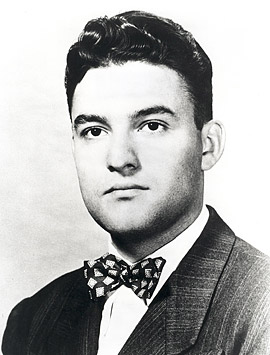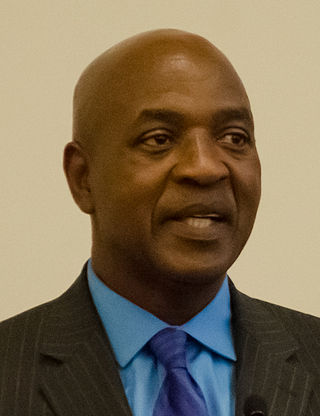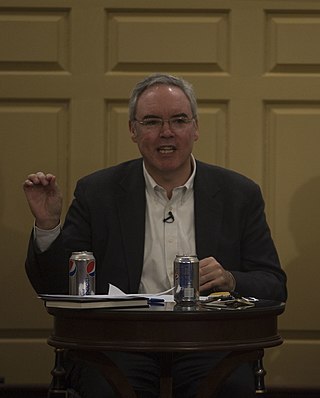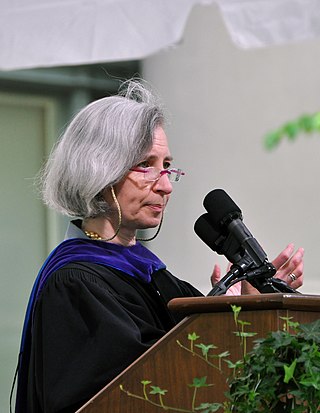Related Research Articles

The Federalist Society for Law and Public Policy Studies (FedSoc) is an American conservative and libertarian legal organization that advocates for a textualist and originalist interpretation of the U.S. Constitution. Headquartered in Washington, D.C., it has chapters at more than 200 law schools and features student, lawyer, and faculty divisions; the lawyers division comprises more than 70,000 practicing attorneys in ninety cities. Through speaking events, lectures, and other activities, it provides a forum for legal experts of opposing views to interact with members of the legal profession, the judiciary, and the legal academy. It is one of the most influential legal organizations in the United States.

Harvard Law School (HLS) is the law school of Harvard University, a private research university in Cambridge, Massachusetts. Founded in 1817, Harvard Law School is the oldest continuously operating law school in the United States.

The Harvard Law Review is a law review published by an independent student group at Harvard Law School. According to the Journal Citation Reports, the Harvard Law Review's 2015 impact factor of 4.979 placed the journal first out of 143 journals in the category "Law". It is published monthly from November through June, with the November issue dedicated to covering the previous year's term of the Supreme Court of the United States. The journal also publishes the online-only Harvard Law Review Forum, a rolling journal of scholarly responses to the main journal's content. The law review is one of three honors societies at the law school, along with the Harvard Legal Aid Bureau and the Board of Student Advisors. Students who are selected for more than one of these three organizations may only join one.

Anna Pauline "Pauli" Murray was an American civil rights activist, advocate, legal scholar and theorist, author and – later in life – an Episcopal priest. Murray's work influenced the civil rights movement and expanded legal protection for gender equality.

Jack Greenberg was an American attorney and legal scholar. He was the Director-Counsel of the NAACP Legal Defense Fund from 1961 to 1984, succeeding Thurgood Marshall. He was involved in numerous crucial cases, including Brown v. Board of Education, which ended segregation in public schools. In all, he argued 40 civil rights cases before the U.S. Supreme Court, and won almost all of them.

Derrick Albert Bell Jr. was an American lawyer, legal scholar, and civil rights activist. Bell first worked for the U.S. Justice Department, then the NAACP Legal Defense Fund, where he supervised over 300 school desegregation cases in Mississippi.

Mari J. Matsuda is an American lawyer, activist, and law professor at the William S. Richardson School of Law at the University of Hawaiʻi at Mānoa. She was the first tenured female Asian American law professor in the United States, at University of California, Los Angeles (UCLA) School of Law in 1998 and one of the leading voices in critical race theory since its inception. Matsuda returned to Richardson in the fall of 2008. Prior to her return, Matsuda was a professor at the UCLA School of Law and Georgetown University Law Center, specializing in the fields of torts, constitutional law, legal history, feminist theory, critical race theory, and civil rights law.

Charles James Ogletree Jr. was an American legal scholar who served as the Jesse Climenko Professor at Harvard Law School, where he was the founder of the school's Charles Hamilton Houston Institute for Race and Justice. He was also the author of books on legal topics.

Spencer A. Overton is an American lawyer, President of the Joint Center for Political and Economic Studies, and law professor at George Washington University Law School. He is a leading election law scholar, and is a tenured Professor of Law at George Washington University.

Thomas J. Sugrue is an American historian of the 20th-century United States currently serving as a professor at New York University. From 1991 to 2015, he was the David Boies Professor of History and Sociology at the University of Pennsylvania and founding director of the Penn Social Science and Policy Forum. His areas of expertise include American urban history, American political history, housing and the history of race relations. He has published extensively on the history of liberalism and conservatism, on housing and real estate, on poverty and public policy, on civil rights, and on the history of affirmative action.

Michael J. Klarman is an American legal historian and scholar of constitutional law. Currently, Klarman is the Kirkland & Ellis Professor at Harvard Law School. Formerly, he was James Monroe Distinguished Professor of Law, Professor of History, and Elizabeth D. and Richard A. Merrill Research Professor at the University of Virginia School of Law.
The Fletcher Foundation was a nonprofit foundation that supported civil rights, education, and environmental education. The foundation supported efforts to develop a more just society with more equal opportunities for more of the population primarily by leveraging the financial and non-financial contributions of Fletcher Asset Management, the Fletcher Family including New York financier and philanthropist Alphonse Fletcher, Jr., and others. Fletcher Asset Management has been accused of fraud related to its management of funds and the value of pledges Fletcher's charitable pledges are in dispute. The Foundation lost its tax-exempt status in 2018.

Kimberlé Williams Crenshaw is an American civil rights advocate and a leading scholar of using critical race theory as a lens to further explore and examine the Tulsa race massacre. She is a professor at the UCLA School of Law and Columbia Law School, where she specializes in race and gender issues.

Martha Louise Minow is an American legal scholar and the 300th Anniversary University Professor at Harvard University. She served as the 12th Dean of Harvard Law School between 2009 and 2017 and has taught at the Law School since 1981.
Norman W. Spaulding III is a professor of federal civil procedure and professional ethics at Stanford Law School.

Pamela Susan Karlan is an American legal scholar who was the principal deputy assistant attorney general in the Civil Rights Division of the United States Department of Justice from February 8, 2021 until July 1, 2022. She is a professor at Stanford Law School. A leading legal scholar on voting rights and constitutional law, she previously served as U.S. Deputy Assistant Attorney General for Voting Rights in the DOJ's Civil Rights Division from 2014 to 2015.
Ralph Richard Banks is a professor at Stanford Law School, where he has taught since 1998. He also teaches at the Stanford Graduate School of Education. His scholarship focuses on race, inequality and the law. He published the book Is Marriage for White People?: How the African American Marriage Decline Affects Everyone in 2011.
Tomiko Brown-Nagin is an American law professor, historian, author, and university leader. She is dean of Harvard Radcliffe Institute, one of the world's leading centers for interdisciplinary research across the humanities, sciences, social sciences, arts, and professions. She is also the Daniel P.S. Paul Professor of Constitutional Law at Harvard Law School and a Harvard University professor of history.
Suzette M. Malveaux is an American law professor and civil rights lawyer. She is currently Provost Professor of Civil Rights Law and Director of the Byron R. White Center for the Study of American Law at the University of Colorado Law School. She has also taught at the Columbus School of Law, Catholic University of America and the University of Alabama School of Law. She teaches Civil Procedure, Complex Litigation, Employment Discrimination and Civil Rights. She is a nationally recognized expert on civil rights law and class action litigation, who has appeared before the U.S. Supreme Court and argued before the 11th Circuit Court of Appeals. She is a member of the American Law Institute.
Deborah N. Archer is an American civil rights lawyer and law professor. She is the Jacob K. Javits Professor at New York University and professor of clinical law at New York University School of Law. She also directs the Center on Race, Inequality, and the Law and the Civil Rights Clinic at NYU School of Law. In January 2021, she was elected president of the American Civil Liberties Union, becoming the first African American to hold the position in the organization’s history.
References
- 1 2 "An op-ed by Professor Kenneth Mack: Even at Harvard, Obama had a knack for bonding".
- ↑ "Dr. Kenneth W. Mack to Give HU's Commencement Address". Archived from the original on 2012-08-02. Retrieved 2012-04-07.
- ↑ "Kenneth W. Mack". Harvard Law Review .
- ↑ "Kenneth W. Mack". Yale Law Journal .
- ↑ Mack, Kenneth W. (2006). "Law and Mass Politics in the Making of the Civil Rights Lawyer, 1931–1941". Journal of American History . 93 (1): 37–62. doi:10.2307/4486059. JSTOR 4486059.
- ↑ Mack, Kenneth W. (Fall 2009). "Bringing the Law Back into the History of the Civil Rights Movement". Law and History Review . 27 (3): 657–669. doi:10.1017/S0738248000003941. S2CID 204327088.
- ↑ "It's Not Obama, It's Just the Sixth Year". 7 November 2014.
- ↑ Mack, Kenneth W. (November 9, 2012). "Five myths about two-term presidents". Washington Post .
- ↑ Mack, Kenneth W. "A measure of history". Boston.com.
- ↑ Mack, Kenneth W. (April 6, 2012). "The Roots of Clarence Thomas' Black Burden" . Retrieved March 16, 2022.
- ↑ Mack, Kenneth W. (July 4, 2007). "Which side is Brown vs. Board on?". Los Angeles Times .
- ↑ "How Will History Remember This Year's Landmark Supreme Court Decisions?". PBS . 4 July 2013.
- ↑ "Third Class Of Fletcher Fellows Announced" (PDF) (Press release). Fletcher Foundation. May 23, 2007. Archived from the original (PDF) on October 5, 2011.
- ↑ "Mack receives honorary degree".